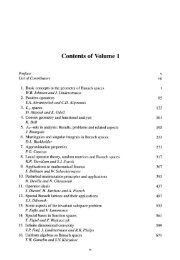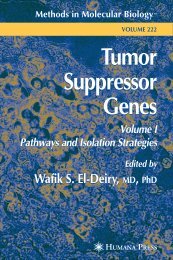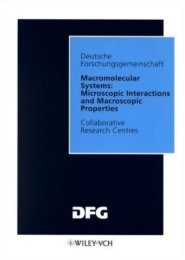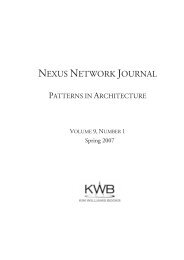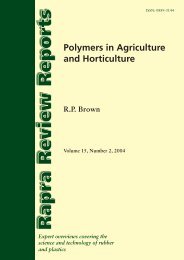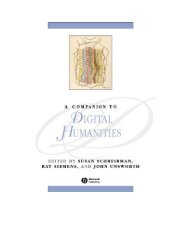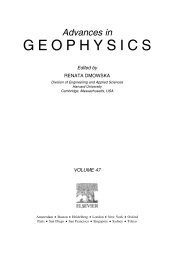- Page 1 and 2:
Alkoxo and Aryloxo Derivatives of M
- Page 3 and 4:
1 Introduction In 1978 the book ent
- Page 5 and 6:
1 INTRODUCTION 2 Homometallic Alkox
- Page 7 and 8:
Homometallic Alkoxides 5 to complet
- Page 9 and 10:
Table 2.1 (Continued) Homometallic
- Page 11 and 12:
Table 2.1 (Continued) Homometallic
- Page 13 and 14:
Table 2.1 (Continued) Homometallic
- Page 15 and 16:
Table 2.1 (Continued) Homometallic
- Page 17 and 18:
Homometallic Alkoxides 15 reactivit
- Page 19 and 20:
Homometallic Alkoxides 17 By contra
- Page 21 and 22:
Homometallic Alkoxides 19 2.3 React
- Page 23 and 24:
Homometallic Alkoxides 21 has been
- Page 25 and 26:
Homometallic Alkoxides 23 obtain on
- Page 27 and 28:
y Evans and co-workers: 160,161 Hom
- Page 29 and 30:
Homometallic Alkoxides 27 The heter
- Page 31 and 32:
Homometallic Alkoxides 29 not conve
- Page 33 and 34:
Homometallic Alkoxides 31 In view o
- Page 35 and 36:
2.7.2 Steric Factors Homometallic A
- Page 37 and 38:
Homometallic Alkoxides 35 (b) When
- Page 39 and 40:
Homometallic Alkoxides 37 2.8 Trans
- Page 41 and 42:
Homometallic Alkoxides 39 with orga
- Page 43 and 44:
2.9.1.1 Alkoxides of Be, Mg, Ca, Sr
- Page 45 and 46:
MfN⊲SiMe3⊳2g2thfx C2HOR, Cpy !C
- Page 47 and 48:
Homometallic Alkoxides 45 2.10 Misc
- Page 49 and 50:
Zr⊲CH2Bu t ⊳4 C 4RfOH benzene !
- Page 51 and 52:
2.10.5 By Insertion of Oxygen into
- Page 53 and 54:
Homometallic Alkoxides 51 First hom
- Page 55 and 56:
O M R M OR M OR RO M (M = Tl; R = M
- Page 57 and 58:
Homometallic Alkoxides 55 3. Nuclea
- Page 59 and 60:
Homometallic Alkoxides 57 explain t
- Page 61 and 62:
Decomposition (%) 100 80 60 40 20 0
- Page 63 and 64:
Table 2.6 Volatilities of tetravale
- Page 65 and 66:
Homometallic Alkoxides 63 deduced t
- Page 67 and 68:
Table 2.10 Vapour pressure of Ti, Z
- Page 69 and 70:
Homometallic Alkoxides 67 Table 2.1
- Page 71 and 72:
3.2.10 Alkoxides of Later 3d Metals
- Page 73 and 74:
Homometallic Alkoxides 71 Table 2.1
- Page 75 and 76:
Homometallic Alkoxides 73 affected
- Page 77 and 78:
Homometallic Alkoxides 75 the range
- Page 79 and 80:
Homometallic Alkoxides 77 several c
- Page 81 and 82:
Table 2.20 (Continued) Homometallic
- Page 83 and 84:
Homometallic Alkoxides 81 In toluen
- Page 85 and 86:
Bu t O Bu t O Bu t O Th O O Bu O t
- Page 87 and 88:
Homometallic Alkoxides 85 1H NMR st
- Page 89 and 90:
Homometallic Alkoxides 87 septet wa
- Page 91 and 92:
Homometallic Alkoxides 89 experimen
- Page 93 and 94:
Table 2.21 1 H NMR spectra of Al4(O
- Page 95 and 96:
Homometallic Alkoxides 93 3.5 Elect
- Page 97 and 98:
Homometallic Alkoxides 95 ligand fi
- Page 99 and 100:
Homometallic Alkoxides 97 susceptib
- Page 101 and 102:
10 −1 /xM 12 10 −200 −100 0 [
- Page 103 and 104:
Homometallic Alkoxides 101 alkoxide
- Page 105 and 106:
Homometallic Alkoxides 103 fragment
- Page 107 and 108:
Homometallic Alkoxides 105 The mass
- Page 109 and 110:
Homometallic Alkoxides 107 [Al⊲OP
- Page 111 and 112:
Homometallic Alkoxides 109 Under ca
- Page 113 and 114:
4.3.2 Phenol-Alcohol Exchange React
- Page 115 and 116:
4.4 Reactions with Alkanolamines Ho
- Page 117 and 118:
Homometallic Alkoxides 115 R D Pr i
- Page 119 and 120:
Homometallic Alkoxides 117 La(OPr i
- Page 121 and 122:
Homometallic Alkoxides 119 with the
- Page 123 and 124:
Homometallic Alkoxides 121 about 1.
- Page 125 and 126:
Homometallic Alkoxides 123 concentr
- Page 127 and 128:
Homometallic Alkoxides 125 and othe
- Page 129 and 130:
Homometallic Alkoxides 127 Interest
- Page 131 and 132:
OH Monofunctional bidentate HC N R
- Page 133 and 134:
Homometallic Alkoxides 131 metal al
- Page 135 and 136:
Homometallic Alkoxides 133 which yi
- Page 137 and 138:
shown in Eq. (2.286): O Mo2(OEt)6 H
- Page 139 and 140:
Homometallic Alkoxides 137 Phenyl i
- Page 141 and 142:
Homometallic Alkoxides 139 The 1990
- Page 143 and 144:
Eqs (2.312)-(2.315): where R D l-ad
- Page 145 and 146:
Homometallic Alkoxides 143 On the b
- Page 147 and 148:
Homometallic Alkoxides 145 The form
- Page 149 and 150:
Homometallic Alkoxides 147 On furth
- Page 151 and 152:
4.16 Interactions Between Two Diffe
- Page 153 and 154:
4Mo2(OPr i )6 + 18CO (excess) Homom
- Page 155 and 156:
isolobality of CR 0 and W⊲OR⊳3
- Page 157 and 158:
W2(OR)8 (R = CH2Bu t ) + CO + H2C C
- Page 159 and 160:
Homometallic Alkoxides 157 43. J.S.
- Page 161 and 162:
Homometallic Alkoxides 159 122. P.N
- Page 163 and 164:
Homometallic Alkoxides 161 201. A.
- Page 165 and 166:
Homometallic Alkoxides 163 281. R.C
- Page 167 and 168:
Homometallic Alkoxides 165 358. L.A
- Page 169 and 170:
Homometallic Alkoxides 167 430. M.R
- Page 171 and 172:
Homometallic Alkoxides 169 521. I.
- Page 173 and 174:
Homometallic Alkoxides 171 N.I. Koz
- Page 175 and 176:
Homometallic Alkoxides 173 694. R.C
- Page 177 and 178:
Homometallic Alkoxides 175 786. R.C
- Page 179 and 180:
Homometallic Alkoxides 177 876. J.
- Page 181 and 182:
Homometallic Alkoxides 179 966. H.
- Page 183 and 184:
Homometallic Alkoxides 181 1054. M.
- Page 185 and 186:
184 Alkoxo and Aryloxo Derivatives
- Page 187 and 188:
186 Alkoxo and Aryloxo Derivatives
- Page 189 and 190:
188 Alkoxo and Aryloxo Derivatives
- Page 191 and 192:
190 Alkoxo and Aryloxo Derivatives
- Page 193 and 194:
192 Alkoxo and Aryloxo Derivatives
- Page 195 and 196:
194 Alkoxo and Aryloxo Derivatives
- Page 197 and 198:
196 Alkoxo and Aryloxo Derivatives
- Page 199 and 200:
198 Alkoxo and Aryloxo Derivatives
- Page 201 and 202:
200 Alkoxo and Aryloxo Derivatives
- Page 203 and 204:
202 Alkoxo and Aryloxo Derivatives
- Page 205 and 206:
204 Alkoxo and Aryloxo Derivatives
- Page 207 and 208:
206 Alkoxo and Aryloxo Derivatives
- Page 209 and 210:
208 Alkoxo and Aryloxo Derivatives
- Page 211 and 212:
210 Alkoxo and Aryloxo Derivatives
- Page 213 and 214:
212 Alkoxo and Aryloxo Derivatives
- Page 215 and 216:
214 Alkoxo and Aryloxo Derivatives
- Page 217 and 218:
216 Alkoxo and Aryloxo Derivatives
- Page 219 and 220:
218 Alkoxo and Aryloxo Derivatives
- Page 221 and 222:
220 Alkoxo and Aryloxo Derivatives
- Page 223 and 224:
222 Alkoxo and Aryloxo Derivatives
- Page 225 and 226:
224 Alkoxo and Aryloxo Derivatives
- Page 227 and 228:
226 Alkoxo and Aryloxo Derivatives
- Page 229 and 230:
228 Alkoxo and Aryloxo Derivatives
- Page 231 and 232:
230 Alkoxo and Aryloxo Derivatives
- Page 233 and 234:
232 Alkoxo and Aryloxo Derivatives
- Page 235 and 236:
234 Alkoxo and Aryloxo Derivatives
- Page 237 and 238:
236 Table 4.1 (Continued) M-O Bond
- Page 239 and 240:
238 Alkoxo and Aryloxo Derivatives
- Page 241 and 242:
240 Alkoxo and Aryloxo Derivatives
- Page 243 and 244:
242 Alkoxo and Aryloxo Derivatives
- Page 245 and 246:
244 Table 4.3 Alkoxides of aluminiu
- Page 247 and 248:
246 Alkoxo and Aryloxo Derivatives
- Page 249 and 250:
248 Table 4.4 Alkoxides of germaniu
- Page 251 and 252:
250 Alkoxo and Aryloxo Derivatives
- Page 253 and 254:
252 Alkoxo and Aryloxo Derivatives
- Page 255 and 256:
254 Alkoxo and Aryloxo Derivatives
- Page 257 and 258:
256 Table 4.6 Alkoxides of scandium
- Page 259 and 260:
258 Alkoxo and Aryloxo Derivatives
- Page 261 and 262:
260 Alkoxo and Aryloxo Derivatives
- Page 263 and 264:
262 Alkoxo and Aryloxo Derivatives
- Page 265 and 266:
264 Table 4.7 Alkoxides of lanthani
- Page 267 and 268:
266 Alkoxo and Aryloxo Derivatives
- Page 269 and 270:
268 Alkoxo and Aryloxo Derivatives
- Page 271 and 272:
270 Table 4.8 (Continued) M-O Bond
- Page 273 and 274:
272 Alkoxo and Aryloxo Derivatives
- Page 275 and 276:
274 Alkoxo and Aryloxo Derivatives
- Page 277 and 278:
276 Table 4.9 Alkoxides of titanium
- Page 279 and 280:
278 Table 4.9 (Continued) Bond leng
- Page 281 and 282:
280 Alkoxo and Aryloxo Derivatives
- Page 283 and 284:
282 Alkoxo and Aryloxo Derivatives
- Page 285 and 286:
284 Alkoxo and Aryloxo Derivatives
- Page 287 and 288:
286 Alkoxo and Aryloxo Derivatives
- Page 289 and 290:
288 Alkoxo and Aryloxo Derivatives
- Page 291 and 292:
290 Alkoxo and Aryloxo Derivatives
- Page 293 and 294:
292 Alkoxo and Aryloxo Derivatives
- Page 295 and 296:
294 Alkoxo and Aryloxo Derivatives
- Page 297 and 298:
296 Alkoxo and Aryloxo Derivatives
- Page 299 and 300:
298 Alkoxo and Aryloxo Derivatives
- Page 301 and 302:
300 Table 4.11 Alkoxides of chromiu
- Page 303 and 304:
302 Table 4.11 (Continued) Metal M-
- Page 305 and 306:
304 Table 4.11 (Continued) M-O Bond
- Page 307 and 308:
306 Table 4.11 (Continued) M-O Bond
- Page 309 and 310:
308 Table 4.11 (Continued) M-O Bond
- Page 311 and 312:
310 Table 4.11 (Continued) M-O Bond
- Page 313 and 314:
312 Table 4.11 (Continued) M-O Bond
- Page 315 and 316:
314 Table 4.11 (Continued) M-O Bond
- Page 317 and 318:
316 Table 4.11 (Continued) Metal M-
- Page 319 and 320:
318 Table 4.11 (Continued) M-O Bond
- Page 321 and 322:
320 Alkoxo and Aryloxo Derivatives
- Page 323 and 324:
322 Table 4.12 Alkoxides of mangane
- Page 325 and 326:
324 Alkoxo and Aryloxo Derivatives
- Page 327 and 328:
326 Alkoxo and Aryloxo Derivatives
- Page 329 and 330:
328 Table 4.15 (Continued) M-O Bond
- Page 331 and 332:
330 Alkoxo and Aryloxo Derivatives
- Page 333 and 334:
332 Table 4.16 Alkoxides of zinc, c
- Page 335 and 336:
334 Alkoxo and Aryloxo Derivatives
- Page 337 and 338:
336 Alkoxo and Aryloxo Derivatives
- Page 339 and 340:
338 Alkoxo and Aryloxo Derivatives
- Page 341 and 342:
340 Table 4.17 (Continued) Coordina
- Page 343 and 344:
342 Table 4.17 (Continued) Coordina
- Page 345 and 346:
344 Table 4.17 (Continued) Coordina
- Page 347 and 348:
346 Alkoxo and Aryloxo Derivatives
- Page 349 and 350:
348 Table 4.18 Bimetallic alkoxides
- Page 351 and 352:
350 Table 4.18 (Continued) Coordina
- Page 353 and 354:
352 Table 4.18 (Continued) Coordina
- Page 355 and 356:
354 Table 4.19 Heterometallic alkox
- Page 357 and 358:
356 Alkoxo and Aryloxo Derivatives
- Page 359 and 360:
358 Table 4.20 Heterometallic alkox
- Page 361 and 362:
360 Table 4.20 (Continued) Coordina
- Page 363 and 364:
362 Table 4.21 Heterometallic alkox
- Page 365 and 366:
364 Alkoxo and Aryloxo Derivatives
- Page 367 and 368:
366 Table 4.22 (Continued) Coordina
- Page 369 and 370:
368 Alkoxo and Aryloxo Derivatives
- Page 371 and 372:
370 Alkoxo and Aryloxo Derivatives
- Page 373 and 374:
372 Alkoxo and Aryloxo Derivatives
- Page 375 and 376:
374 Alkoxo and Aryloxo Derivatives
- Page 377 and 378:
376 Alkoxo and Aryloxo Derivatives
- Page 379 and 380:
378 Alkoxo and Aryloxo Derivatives
- Page 381 and 382:
380 Alkoxo and Aryloxo Derivatives
- Page 383 and 384:
382 Alkoxo and Aryloxo Derivatives
- Page 385 and 386:
384 Alkoxo and Aryloxo Derivatives
- Page 387 and 388:
386 Alkoxo and Aryloxo Derivatives
- Page 389 and 390:
388 Alkoxo and Aryloxo Derivatives
- Page 391 and 392:
390 Alkoxo and Aryloxo Derivatives
- Page 393 and 394:
392 Alkoxo and Aryloxo Derivatives
- Page 395 and 396:
394 Table 5.2 Chemical shifts from
- Page 397 and 398:
396 Alkoxo and Aryloxo Derivatives
- Page 399 and 400:
398 Alkoxo and Aryloxo Derivatives
- Page 401 and 402:
400 Table 5.3 Scandium, yttrium, la
- Page 403 and 404:
402 Table 5.3 (continued) Metal Oxo
- Page 405 and 406:
404 Alkoxo and Aryloxo Derivatives
- Page 407 and 408:
406 Table 5.4 Titanium and zirconiu
- Page 409 and 410:
408 Alkoxo and Aryloxo Derivatives
- Page 411 and 412:
410 Alkoxo and Aryloxo Derivatives
- Page 413 and 414:
412 Alkoxo and Aryloxo Derivatives
- Page 415 and 416:
414 Table 5.5 (continued) Metal Oxo
- Page 417 and 418:
416 Alkoxo and Aryloxo Derivatives
- Page 419 and 420:
418 Alkoxo and Aryloxo Derivatives
- Page 421 and 422:
420 Table 5.6 Chromium sub-group me
- Page 423 and 424:
422 Table 5.6 (continued) Metal Oxo
- Page 425 and 426:
424 Table 5.6 (continued) Metal Oxo
- Page 427 and 428:
426 Alkoxo and Aryloxo Derivatives
- Page 429 and 430:
428 Alkoxo and Aryloxo Derivatives
- Page 431 and 432:
430 Alkoxo and Aryloxo Derivatives
- Page 433 and 434:
432 Alkoxo and Aryloxo Derivatives
- Page 435 and 436:
434 Table 5.9 (continued) Metal Oxo
- Page 437 and 438:
436 Alkoxo and Aryloxo Derivatives
- Page 439 and 440:
438 Alkoxo and Aryloxo Derivatives
- Page 441 and 442:
440 Alkoxo and Aryloxo Derivatives
- Page 443 and 444:
442 Alkoxo and Aryloxo Derivatives
- Page 445 and 446:
1 INTRODUCTION 6 Metal Aryloxides T
- Page 447 and 448:
Metal Aryloxides 447 or both of the
- Page 449 and 450:
R1 OH O R2 R3NH2 −H2O Scheme 6.3
- Page 451 and 452:
Cl S N N OH O Cl Me 3C NH HN OH HO
- Page 453 and 454:
N OH N OH Me 3C Me3C HO HO N N OH H
- Page 455 and 456:
Metal Aryloxides 455 2Ln C 3Hg⊲C6
- Page 457 and 458:
Metal Aryloxides 457 Mixed halo, ar
- Page 459 and 460:
product metal aryloxide 1e,1f (Eqs
- Page 461 and 462:
Metal Aryloxides 461 Eqs 6.39 and 6
- Page 463 and 464:
O Mg Mg OAr O Metal Aryloxides 463
- Page 465 and 466:
3.7 From Metal Hydrides Metal Arylo
- Page 467 and 468:
Metal Aryloxides 467 Two other impo
- Page 469 and 470:
Metal Aryloxides 469 Table 6.1 Meta
- Page 471 and 472:
Table 6.3 W-OAr distances for vario
- Page 473 and 474:
Metal Aryloxides 473 At first it is
- Page 475 and 476:
Zr−O distance (Å) V−O distance
- Page 477 and 478:
Metal Aryloxides 477 as expected ar
- Page 479 and 480:
Metal Aryloxides 479 whereas R D Me
- Page 481 and 482:
where OAr = O But But H3C H3C O Ta
- Page 483 and 484:
PPh 2 Ph P Pt OAr PPh2 where OAr =
- Page 485 and 486:
6 SURVEY OF METAL ARYLOXIDES 6.1 Sp
- Page 487 and 488:
487 Na2[V(O) 2(OAr) 2]2.4H2O.DMF 6-
- Page 489 and 490:
489 [Tc(O)(OAr)(di-OAr)] 8-quin 2.0
- Page 491 and 492:
491 [Ni3⊲OAr⊳6][ClO4].EtOH 8-qu
- Page 493 and 494:
493 [Pt(OAr⊳2](tcnq) sq. planar P
- Page 495 and 496:
495 [Al(OAr) 3].MeOH 8-quin 1.850 (
- Page 497 and 498:
497 [Sb(OAr) 2⊲S2COEt⊳] pentago
- Page 499 and 500:
499 [Tc(O)(OAr)(N-salicylideneDD-gl
- Page 501 and 502:
Metal Aryloxides 501 A contribution
- Page 503 and 504:
503 Table 6.8 Metal bi-phenolates B
- Page 505 and 506:
505 Table 6.9 Metal binaphtholates
- Page 507 and 508:
507 [TiCl2(di-OAr)]2 two tetrahedra
- Page 509 and 510:
Metal Aryloxides 509 co-workers hav
- Page 511 and 512:
511 [Li⊲ 2-OAr⊳]3 planar Li3O3
- Page 513 and 514:
513 Table 6.11 Sodium aryloxides Bo
- Page 515 and 516:
Table 6.12 Potassium aryloxides Met
- Page 517 and 518:
Table 6.15 Magnesium aryloxides Met
- Page 519 and 520:
519 Table 6.18 Barium aryloxides Bo
- Page 521 and 522:
521 Table 6.19 Group 3 metal and la
- Page 523 and 524:
523 [Me4N]La2Na2⊲ 4-OAr⊳⊲ 3-O
- Page 525 and 526:
525 [Nd⊲OC6H3Ph- 6-C6H5⊳⊲OC6H
- Page 527 and 528:
527 [⊲THF⊳Li⊲ 2-OAr⊳2Sm⊲C
- Page 529 and 530:
529 [Eu⊲ 2-OAr⊳4⊲OAr⊳2⊲ 3
- Page 531 and 532:
531 [Yb(OAr) 3⊲THF⊳2].THF squar
- Page 533 and 534:
Metal Aryloxides 533 carbon atoms a
- Page 535 and 536:
535 [Cp Ł Th(OAr)⊲CH2SiMe3⊳2]
- Page 537 and 538:
Metal Aryloxides 537 amido compound
- Page 539 and 540:
539 Table 6.21 Titanium aryloxides
- Page 541 and 542:
541 [Ti2⊲ 2-OAr⊳2(OAr) 2Cl4]2 e
- Page 543 and 544:
543 [Ti(OAr) 2⊲NMe2⊳2] tetrahed
- Page 545 and 546:
545 [Ti(OAr) 3Bu t ] tetrahedral Ti
- Page 547 and 548:
547 [⊲ArO⊳2Ti⊲ 2-ButNDCC4Et4C
- Page 549 and 550:
549 [Cp⊲C5H3Me-Pri-1,2)Ti(OAr)Cl]
- Page 551 and 552:
551 [CpTi(OAr) 2⊲HPPh⊳] OC6H3Pr
- Page 553 and 554:
553 [Ti⊲di-OAr⊳Cl2].THF 6-coord
- Page 555 and 556:
555 Table 6.22 Zirconium aryloxides
- Page 557 and 558:
557 [Zr(Ind-OAr) 2] 1-indenylphenox
- Page 559 and 560:
559 [Cp2Zr(OAr)] 18-electron Zr, tw
- Page 561 and 562:
Metal Aryloxides 561 The thermal st
- Page 563 and 564: Metal Aryloxides 563 can only arise
- Page 565 and 566: 565 1.839 (2) 138 1.854 (2) 140 [(t
- Page 567 and 568: 567 [V(OAr) 3-N-Li(THF) 3] tetrahed
- Page 569 and 570: 569 [V(O)(di-OAr)] 6-coord. V, both
- Page 571 and 572: 571 cis,mer-[Nb(OAr) 2Cl3(THF)] dis
- Page 573 and 574: 573 [Nb⊲OC6H3Ph- 4-C6H7⊳⊲OAr
- Page 575 and 576: 575 Table 6.26 Tantalum aryloxides
- Page 577 and 578: 577 [(THF)(ArO) 3Ta⊲DNND⊳Ta(OAr
- Page 579 and 580: 579 [Ta(OAr) 2Cl2⊲CH2C6H5⊳] tbp
- Page 581 and 582: 581 [Ta(OAr) 2Cl⊲ 6-C6Me6⊳] OC6
- Page 583 and 584: 583 [Ta(OAr)⊲OC6H3Pri- 2-CMeDCH2
- Page 585 and 586: 585 [f(TMEDA)Na⊲ 2-OAr⊳2g2Cr] 4
- Page 587 and 588: 587 Table 6.28 Molybdenum aryloxide
- Page 589 and 590: 589 [Mo2⊲OAr⊳5⊲NMe2⊳⊲HNMe
- Page 591 and 592: 591 [Mo(Hdi-OAr) 2] 6-coord. Mo, on
- Page 593 and 594: 593 [W2⊲OAr⊳6⊲HNMe2⊳2] OC6F
- Page 595 and 596: 595 [W(OAr) 2⊲DNBu t ⊳2] OC6H3P
- Page 597 and 598: 597 [W(OC6H3Ph- 1-C6H4⊳2⊲PMePh2
- Page 599 and 600: 599 [W⊲OC6HPh3- 1-C6H4-c-C5H8C- O
- Page 601 and 602: 601 [⊲OC⊳3Mn⊲C4H4N⊳Mn⊲CO3
- Page 603 and 604: 603 Table 6.32 Simple aryloxides of
- Page 605 and 606: 605 Table 6.33 Simple aryloxides of
- Page 607 and 608: 607 [NEt4]3fFe6⊲ 4-S⊳4⊲OAr⊳
- Page 609 and 610: 609 [Ru(OAr) 2(CO)(py-CMeO-4)] cis-
- Page 611 and 612: Table 6.35 Simple aryloxides of osm
- Page 613: Metal Aryloxides 613 states, e.g. [
- Page 617 and 618: 6.2.10 Group 9 Metal Aryloxides Met
- Page 619 and 620: Table 6.38 Simple aryloxides of iri
- Page 621 and 622: Metal Aryloxides 621 Table 6.39 (Co
- Page 623 and 624: 623 [Pd(OAr)⊲C6H3fCH2NMe2g2-2,6)]
- Page 625 and 626: Metal Aryloxides 625 Table 6.41 Sim
- Page 627 and 628: 627 Table 6.42 Simple aryloxides of
- Page 629 and 630: 629 [(RNC) 2Cu⊲ 2-OAr⊳2Cu(CNR)
- Page 631 and 632: Metal Aryloxides 631 The two-coordi
- Page 633 and 634: Table 6.45 (Continued) Metal Arylox
- Page 635 and 636: Table 6.47 Simple aryloxides of mer
- Page 637 and 638: 637 Table 6.48 Aluminium aryloxides
- Page 639 and 640: 639 [⊲ArO⊳2Al⊲ -OAr⊳2Mg(THF
- Page 641 and 642: 641 [Al(OAr) 2⊲i-Bu⊳] trigonal
- Page 643 and 644: 643 [Al(OAr)Cl(Me)⊲NH2But⊳] OC6
- Page 645 and 646: 645 Table 6.49 Gallium aryloxides B
- Page 647 and 648: 647 Table 6.50 Indium aryloxides Bo
- Page 649 and 650: Metal Aryloxides 649 Table 6.53 Tin
- Page 651 and 652: 651 Table 6.56 Bismuth aryloxides B
- Page 653 and 654: REFERENCES Metal Aryloxides 653 1.
- Page 655 and 656: Metal Aryloxides 655 56. Y. Nakayam
- Page 657 and 658: Metal Aryloxides 657 123. T.W. Coff
- Page 659 and 660: Metal Aryloxides 659 202. A. Bell,
- Page 661 and 662: Metal Aryloxides 661 268. K. Ishiha
- Page 663 and 664: Metal Aryloxides 663 341. B.S. Kali
- Page 665 and 666:
Metal Aryloxides 665 405. P.N. Rile
- Page 667 and 668:
Metal Aryloxides 667 483. Y. Hayash
- Page 669 and 670:
Metal Aryloxides 669 561. A.P. Shre
- Page 671 and 672:
672 Alkoxo and Aryloxo Derivatives
- Page 673 and 674:
674 Alkoxo and Aryloxo Derivatives
- Page 675 and 676:
676 Alkoxo and Aryloxo Derivatives
- Page 677 and 678:
678 Alkoxo and Aryloxo Derivatives
- Page 679 and 680:
680 Alkoxo and Aryloxo Derivatives
- Page 681 and 682:
682 Alkoxo and Aryloxo Derivatives
- Page 683 and 684:
684 Alkoxo and Aryloxo Derivatives
- Page 685 and 686:
686 Alkoxo and Aryloxo Derivatives
- Page 687 and 688:
688 Index alkoxometallate(IV) ligan
- Page 689 and 690:
690 Index cerium oxo-isopropoxide 3
- Page 691 and 692:
692 Index gas-phase photoelectron s
- Page 693 and 694:
694 Index lead tert-butoxide 386 Le
- Page 695 and 696:
696 Index metal-hydrogen bonds clea
- Page 697 and 698:
698 Index oxo-alkoxides 384, 385, 3
- Page 699 and 700:
700 Index sodium hydroxide 142 sodi
- Page 701 and 702:
702 Index titanium dichloride dieth
- Page 703:
704 Index X X-ray Absorption Near E




